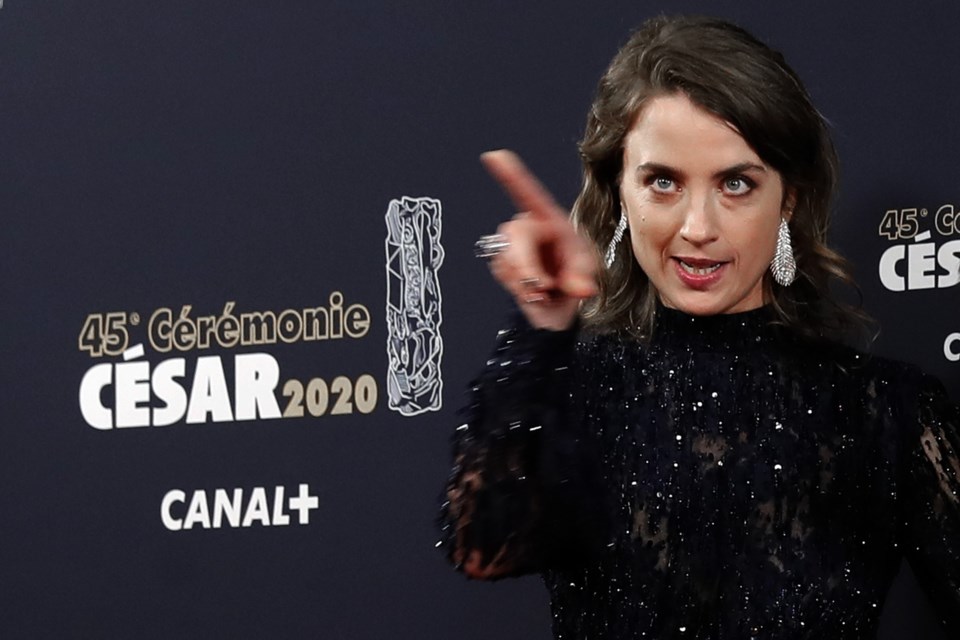PARIS (AP) — French actor Judith Godrèche called on France’s film industry to “face the truth” on sexual violence and physical abuse during a live broadcast Friday of the Cesar Awards ceremony, France’s version of the Oscars.
“We can decide that men accused of rape no longer rule the (French) cinema," Godrèche said.
Godrèche was invited to speak on sexual violence at the ceremony after actors alleged they were teenage victims of sexual abuse by directors decades older than themselves, shining a light on the repulsive underside of the country’s industry.
“Is it possible that we are able to face the truth?” Godrèche said during an emotional speech to a hushed audience.
“With the same moral strength that we use to be creative, let's have the courage to say out loud what we know quietly,” she said, and added later, “The power seems to be swaying.”
The audience stayed silent until the end of her appearance, but then erupted into thunderous applause in a standing ovation.
Her speech comes as French cinema is expected to shine next month at the Oscars ceremony with Justine Triet 's courtroom drama “ Anatomy of a Fall.”
Triet on Friday became the second female film director in the Cesar Award's 49-year history to win the best director award for “Anatomy of a Fall,” which also won best film, original screenplay, actress for Sandra Huller, supporting actor and editing,
Godrèche, 51, is well known to French cinemagoers. She recently accused two film directors of rape and sexual abuse when she was a teenager. She formally filed a complaint earlier this month, the Paris prosecutor said.
She is accusing film director Benoît Jacquot, with whom she had a six-year relationship that started when she was 14, of rape and physical abuse. Jacquot, a prominent director in France, is 25 years her senior.
She is also accusing another film director, Jacques Doillon, of sexual abuse while he was directing a film when she was 15. Doillon is 28 years older than her.
Both Jacquot and Doillon have denied the allegations.
Speaking on France Inter radio earlier this month, Godrèche said that she was never attracted to Jacquot, “but I ended up with him, in his bed, and I was his child wife.” Godrèche and Jacquot met in 1986 on the set of his film “The Beggars.”
“I was indoctrinated, it was as if I’d joined a cult,” she said. The relationship was marred by violence, confinement and control, she said.
Hours before the ceremony, French cultural minister Rachida Dati criticized the country's cinema for “collectively turning a blind eye for decades” to sexual violence. She hailed Godrèche’s courage to speak out and for sharing her traumatic experience.
Judith Godrèche has spoken of her pain in simple terms, Dati said. "She said, I was a child. You saw everything and no one said anything,” the cultural minister said in an interview with The French Film magazine. She added: “This should be the beginning of profound soul searching for French cinema.”
“There is no impunity in the name of art,” Dati said. “Creative freedom is total, but we are not talking about art here, but about a crime against a child,” she added. “Having a sexual relationship with a child under 15, is a crime.”
Godrèche had previously spoken about her relationship with Jacquot, without naming him, in an autobiographical television show called “Icon of French Cinema” that was released in December.
She was among the actors who spoke out in 2017 against U.S. film producer Harvey Weinstein amid the #MeToo movement, accusing him of sexual assault when she was 24.
Jacquot told the Le Monde newspaper that he “doesn’t feel directly concerned” by Godrèche's accusations, with whom he said he fell in love at the time. He denied any abuse of authority.
In a statement to international news agency Agence France-Presse, Doillon said “the just cause doesn’t justify arbitrary denunciations, false accusations and lies.”
Following Godrèche's accusations, other women decided to speak out.
Isild Le Besco, 41, accused Jacquot of “psychological and physical violence” in a relationship with him that began when she was 16 and he was 52. She also accused Doillon of having picked someone else for a role she was supposed to get because she refused his sexual advances.
Another actor, Anna Mouglalis, 45, accused Doillon of sexual assault in 2011.
The French film industry earlier was shaken by sexual misconduct accusations against actor Gérard Depardieu.
In 2020, protests by women’s rights activists were staged during the Cesar Awards ceremony as director Roman Polanski won, in absentia, the best director award. Actor Adèle Haenel, who denounced alleged sexual assault by another French director in the early 2000s when she was 15, got up and walked out of the room.
Polanski is still wanted in the United States decades after he was charged with raping a 13-year-old girl in 1977.
___
Surk reported from Nice, France
Sylvie Corbet And Barbara Surk, The Associated Press



